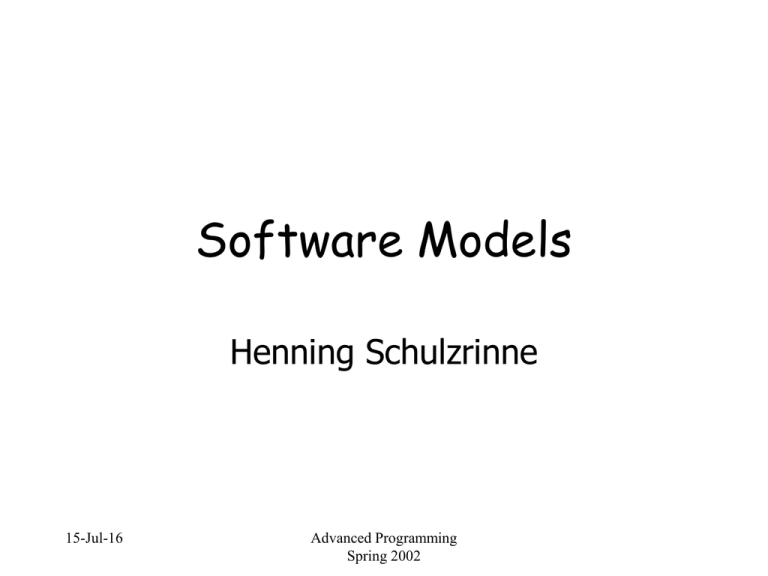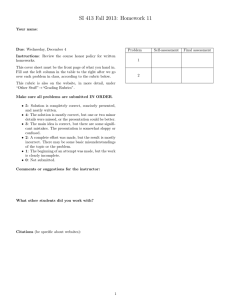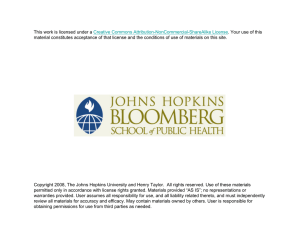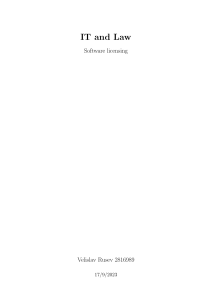
Software Models
Henning Schulzrinne
15-Jul-16
Advanced Programming
Spring 2002
Introduction
Non-technical interlude...
Many more type of software than before:
commercial projects
contract
shareware
open source
Influences:
15-Jul-16
commercial needs
IP protection & licensing
documentation
support
Advanced Programming
Spring 2002
2
Commercial
Classical model, but many variations
Internal vs. for sale
e.g., Columbia SSOL vs. PeopleSoft
One time vs. retail
only run one (or few copies)
custom programming
missile control
retail aka “shrink wrap”, but also download or
“ship and enable”
games: cartridges
embedded – OS, peripheral, cell phones, industrial
control, ...
15-Jul-16
Advanced Programming
Spring 2002
3
Commercial software
Many different licenses:
single computer (Microsoft XP)
multiple computers by same owner (e.g.,
laptop and home) – common for consumer
software
IP address (servers)
floating license – “no more than 3
simultaneous users” (CAD and SE tools)
single network (e.g., within Columbia) –
site license
15-Jul-16
Advanced Programming
Spring 2002
4
Contract
Consulting – individually or through
consulting houses, e.g.,
ArthurAndersen, EDS or Wipro (India)
“Work for hire” – output belongs to
customer (GRA vs. undergraduate!)
Usually, specific to customer
Often, outside of core competency of
client (e.g., gov’t, hospital, ...)
Billed by project or by hour
15-Jul-16
Advanced Programming
Spring 2002
5
Shareware
not = open source
can freely download binaries
usually low-cost, limited functionality
items (e.g., create buttons for web
pages)
“crippleware”: limited functionality
(can’t save work) or time limit on usage
mostly Mac and Windows
15-Jul-16
Advanced Programming
Spring 2002
6
Open source
www.opensource.org
Free redistribution
Source code
distribute either unobfuscated source code
or binaries
Derived works
same license as original code
Integrity of author’s source code
allow distribution of modified code
15-Jul-16
Advanced Programming
Spring 2002
7
Open Source
No discrimination against persons or groups
No discrimination against fields of endeavor
commercial use, non-military use
Not specific to product
not just if part of some distribution
Must not restrict other software
can’t require other software to be open-source
15-Jul-16
Advanced Programming
Spring 2002
8
Open Source
Examples of open-source licenses:
GNU General Public License
modifications are also GPL
GNU Library (Lesser) Public License
allow linking into non-GPL code
BSD license
least restrictive – allow commercial use
Artistic license
force new naming for modifications
15-Jul-16
Advanced Programming
Spring 2002
9
Almost open-source
Lots of programs that are free and/or
provide source code, but:
don’t allow modification (TeX)
non-commercial or educational use only
limited to particular hardware
may be patent-encumbered (e.g., audio
codecs)
only for customer (e.g., in case supplier
goes bankrupt)
15-Jul-16
Advanced Programming
Spring 2002
10
Example: BSD license
Copyright (c) <YEAR>, <OWNER>
All rights reserved.
Redistribution and use in source and binary forms, with or without
modification, are permitted provided that the following conditions are
met:
Redistributions of source code must retain the above copyright notice, this
list of conditions and the following disclaimer.
Redistributions in binary form must reproduce the above copyright notice,
this list of conditions and the following disclaimer in the documentation
and/or other materials provided with the distribution.
Neither the name of the <ORGANIZATION> nor the names of its
contributors may be used to endorse or promote products derived from this
software without specific prior written permission.
THIS SOFTWARE IS PROVIDED BY THE COPYRIGHT HOLDERS AND
CONTRIBUTORS "AS IS" AND ANY EXPRESS OR IMPLIED
WARRANTIES,
15-Jul-16
...
Advanced Programming
Spring 2002
11
Open source arguments
“The Cathedral and the Bazaar” (Eric
Raymond)
Social arguments
knowledge dissemination
avoid wasted effort (“doing it anyway”)
cf. pro bono by lawyers
skill strengthening and visibility (academics)
Technical arguments
quality
security
standards-compliance
testing on many Advanced
systems
15-Jul-16
Programming
Spring 2002
12
Cathedral and the Bazaar
1. Every good work of software starts by
scratching a developer's personal itch.
2. Good programmers know what to write.
Great ones know what to rewrite (and
reuse).
3. ``Plan to throw one away; you will,
anyhow.'' (Fred Brooks, ``The Mythical
Man-Month'', Chapter 11)
4. If you have the right attitude, interesting
problems will find you.
15-Jul-16
Advanced Programming
Spring 2002
13
Cathedral and the Bazaar
5.
6.
7.
8.
9.
10.
When you lose interest in a program, your last duty to it is to
hand it off to a competent successor.
Treating your users as co-developers is your least-hassle
route to rapid code improvement and effective debugging.
Release early. Release often. And listen to your customers.
Given a large enough beta-tester and co-developer base,
almost every problem will be characterized quickly and the fix
obvious to someone.
Smart data structures and dumb code works a lot better than
the other way around.
If you treat your beta-testers as if they're your most valuable
resource, they will respond by becoming your most valuable
resource.
15-Jul-16
Advanced Programming
Spring 2002
14
Cathedral and the Bazaar
11.
12.
13.
14.
15.
16.
17.
15-Jul-16
The next best thing to having good ideas is recognizing
good ideas from your users. Sometimes the latter is better.
Often, the most striking and innovative solutions come from
realizing that your concept of the problem was wrong.
``Perfection (in design) is achieved not when there is
nothing more to add, but rather when there is nothing more
to take away.''
Any tool should be useful in the expected way, but a truly
great tool lends itself to uses you never expected.
When writing gateway software of any kind, take pains to
disturb the data stream as little as possible.
When your language is nowhere near Turing-complete,
syntactic sugar can be your friend.
A security system is only as secure as its secret. Beware of
pseudo-secrets.
Advanced Programming
Spring 2002
15
Open source successes
TeX (not quite open-source)
gcc compiler and tools
Linux and *BSD (FreeBSD, OpenBSD,
NetBSD) operating systems
Apache web server
sendmail mail transport agent (MTA)
gimp bitmap graphics tool
Tcl, Perl, Python language
implementations
15-Jul-16
Advanced Programming
Spring 2002
16
Open source - problems
Ideal: small group of authors write code,
thousands contribute bug fixes (not just bug
reports!) and enhancements
Need large community of technical users
less likely to work well for recipe management or
kid’s games
more forgiving of lack of documentation or clean
install
can integrate different tools
if not, author becomes tech support
15-Jul-16
Advanced Programming
Spring 2002
17
Open source - problems
Thus, works less well for specialized
programs with small user base (hundreds) –
get mostly complaints
Mostly individuals moon-lighting or paid by
unrelated company (e.g., Linus Torvalds)
Business model uncertain:
15-Jul-16
packaging (Red Hat)
tech support contract (MySQL)
free with hardware (IBM)
grants and donations
Advanced Programming
Spring 2002
18
Which model is “right”?
Commercial needs:
size of customer base
who pays?
Intellectual property issues
are there patents?
does employer rely on IPR (trade or sell)?
Documentation
how much documentation is needed to make the
program useful?
How much support is needed?
open-source support: mean vs. variance
15-Jul-16
Advanced Programming
Spring 2002
19
“Levels” of programming
Programmable applications
add macro to Excel
Code generators
generate UI code from “wizard”
Application embedding
new UI for IE or Mozilla
Web scripting
no UI in normal sense
“Classical” application
Java, C
use mostly OS and UI APIs
15-Jul-16
Advanced Programming
Spring 2002
20
“Levels” of programming
Device drivers and OS kernel
embedded systems
specialty OS (e.g., VxWorks) or no OS\
often, lower-end processors
no virtual memory
no cache
limited memory space
special operations (e.g., DSP MAC)
Specialty programming:
language compilers
15-Jul-16
Advanced Programming
Spring 2002
21



